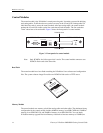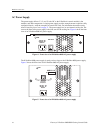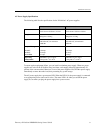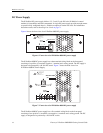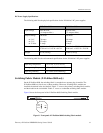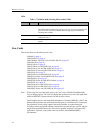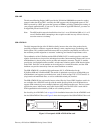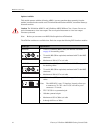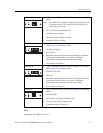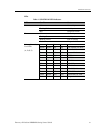
Hardware Overview
20 Enterasys X-Pedition 8000/8600 Getting Started Guide
LEDs
Line Cards
This section addresses the following line cards:
SSR-ARE on page 21
SSR-ATM29-02 on page 21
SSR-CM2B-64, SSR-CM3-128, and SSR-CM4-256 on page 25
SSR-FDDI-02 on page 26
SSR-GLX39-02 on page 28
SSR-GLX39-04 and SSR-GSX31-04 on page 30
SSR-GLX70-01-AA and SSR-GLH39-02 on page 33
SSR-GSX21-02-AA and SSR-GLX29-02-AA on page 35
SSR-GSX31-02 on page 37
SSR-GTX32-04 and SSR-GTX32-02 on page 39
SSR-HFX21-08-AA and SSR-HFX29-08-AA on page 41
SSR-HSSI-02-CK on page 42
SSR-HTX22-08-AA and SSR-HTX12-08-AA on page 44
SSR-HTX32-16 on page 45
SSR-POS29-04 and SSR-POS21-04 on page 46
SSR-POS39-02 and SSR-POS31-02 on page 48
SSR-SERCE-04-AA and SSR-SERC-04-AA on page 50
Note: When using line cards introduced prior to the “AA” series, SNA/DLC/NetBIOS traffic
may not bridge properly. The issue in bridging DLC packets occurs where the length field
within an IEEE 802.3 frame indicates less than 46 bytes of data.
The X-Pedition removes the length field information of incoming IEEE 802.3, 802.2, and
Ethernet SNAP packets, then recalculates the field prior to re-transmission. Consequently,
the calculation is based on the length of the entire data field. A packet entering the
X-Pedition whose length field indicates a data field of less than 46 bytes will exit with the
length field recalculated incorrectly. This can be a problem with LLC2 and legacy IPX
applications. Typically, such packets exist only in SNA and NetBIOS/NetBEUI
environments.
Table 2. X-Pedition 8600 Switching Fabric module LEDs
LED Condition Description
Offline Amber The module is offline (powered off) and is ready for hot swap.
The Offline LED also lights briefly during a reboot or reset of the X-Pedition and
goes out as soon as the control module discovers and properly initializes the
switching fabric module.
Online Green The module is online and is ready to receive, process, and send packets if
configured to do so.
Active On The switching fabric module is actively receiving, processing, and sending
packets.





